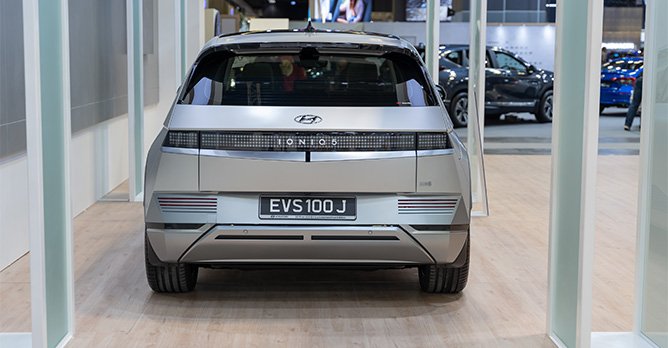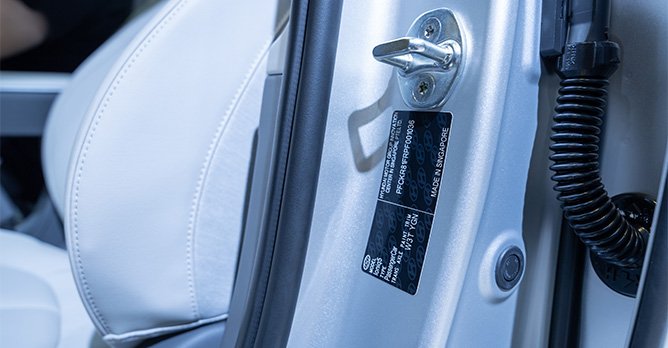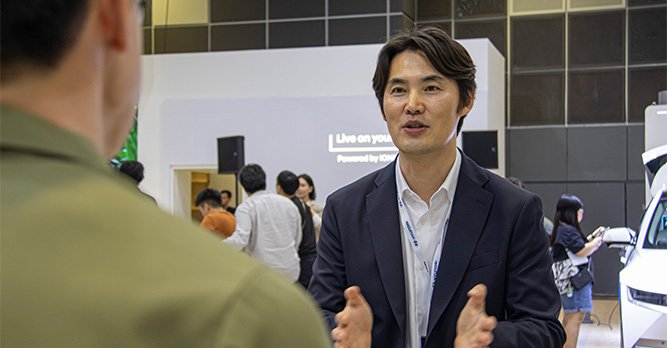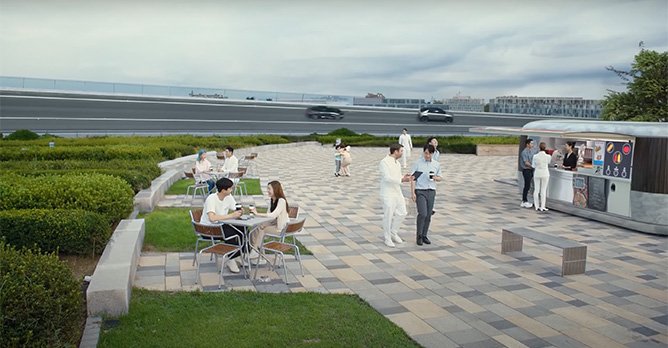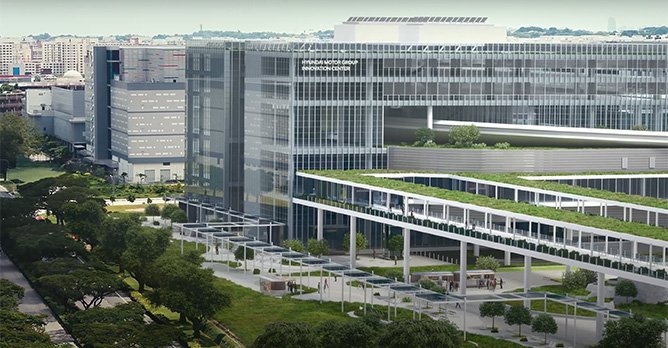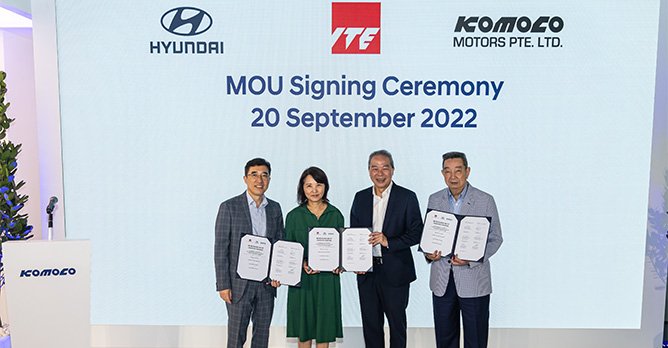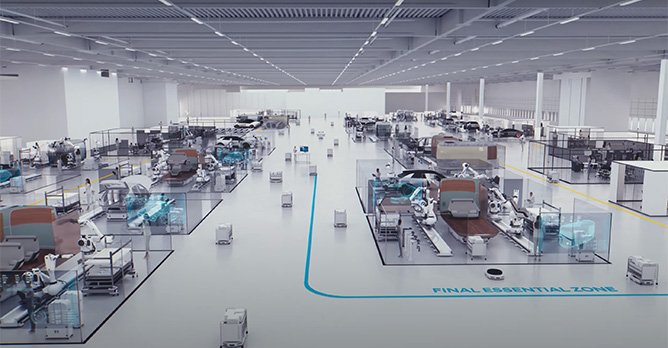Why Singapore? About Hyundai's locally-built Ioniq 5, and why it's named its Jurong facility an 'Innovation Centre'
17 Jan 2023|6,887 views
As it prepares to launch its first locally-assembled cars, Hyundai wants us to know that it values Singapore very much.
At this point, your mind is likely to float instantly to the Ioniq 5 'First 100's - the first 100 of said "Made in Singapore"-units, bearing special design accents, but more fascinatingly, 'EVS' rather than 'S'-prefixed number plates (such plates have not been allowed by the LTA on privately-owned cars before).
Yet while all that is undeniably impressive, perhaps more intriguing is how the Korean carmaker has made actual beyond-surface tweaks to the Ioniq 5 to suit the Singapore market.
To a large crowd encircling its booth at the 2023 Motor Show, it pulled the surprising move of announcing an 'Exclusive' trim of the Ioniq 5 thus far not seen in any other territory. Powered by a 143bhp (or 107kW) motor, this rear-wheel driven variant ducks under the 110kW power ceiling for mass market EVs, thus qualifying for a Cat A COE.
Still, even the Ioniq 5 Exclusive isn't the true star of the conversation. Literally towering further over it all is something that goes beyond just a single car (or a hundred).
Estimated at a cost of $400 million, a seven-storey, hyper-modern facility is set to open in the first half of 2023 in the Jurong Innovation District. It is out of this very site that the cars will roll out.
Why Singapore?
The news of the facility likewise raised many eyebrows when it broke in 2020. Singapore had long relinquished its car-assembling past in a bid to scale the manufacturing value-ladder, while close neighbours like Thailand have only grown more and more in favour with carmakers over the years. Would they not have been the default options to set up a base?
To demystify why Hyundai chose our tiny island over those long-standing heavy weights, you'll first have to dig into how it's named the new project. Note that it's not 'Hyundai Motor Group Factory Singapore'; it's 'Hyundai Motor Group Innovation Centre Singapore' (HMGICS).
"An innovation centre needs the most talented people to study and develop R&D together", Mr. Andy Kang, VP and Head of Sales and Innovation at HMGICS, tells us. "Singapore, I believe, is the highest standard in terms of very talented people and employees."
Slated to open in the first half of this year, the Centre will be powered by renewable energy, and introduce levels of technology Hyundai says have never been seen on a production site.
More concrete details are set to emerge closer to its grand unveiling, but Kang outlines a farm-to-table experience in the centre's restaurant as one of the most exciting things visitors can look forward to (fresh vegetables will be sourced on-site from what has been described for now as a "smart farm"). Go further up to the seventh floor of the "Innovation Lab", and a 620m-long Sky Track awaits customers for test drives.
Then, there's also the unprecedented level of automation that Hyundai is aiming to achieve. While not set in stone yet, Kang says a total workforce of just 30 people on the assembly line is being targeted, with the rest of the labour dedicated to "robotic arms".
"This is a centre that we really would like to be very advanced; which nobody from the automotive sector has tried (to achieve). This is what we are trying to do," he explains.
One key aspect of the Innovation Centre many may overlook at first is the significance of it coming directly under the Hyundai Motor Group. That means it bears weight not just for the Hyundai, but Kia and Genesis brands too.
"[The centre] is the global Group's first-opened innovation hub and testbed for our future-mobility innovation", Mr. Peter Kim, Business Planning at HMGICS, tells us. "So Group-wise and global-wise, HMGICS is very important for the Group."
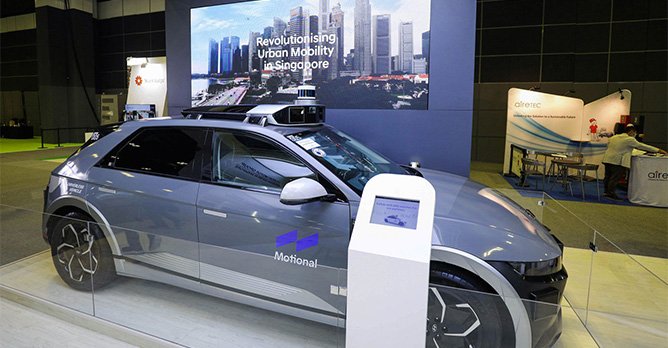
 Motional, a co-venture of Hyundai and Aptiv, has also been running self-driving test runs in one-north While its roots are firmly planted in Seoul, the South Korean conglomerate has long stretched its branches far and wide into the world via a multitude of international living labs. The resulting wealth of knowledge, amassed from this decentralised experience-building, is then intended to trickle down to its vehicles across the entire Group.
Motional, a co-venture of Hyundai and Aptiv, has also been running self-driving test runs in one-north While its roots are firmly planted in Seoul, the South Korean conglomerate has long stretched its branches far and wide into the world via a multitude of international living labs. The resulting wealth of knowledge, amassed from this decentralised experience-building, is then intended to trickle down to its vehicles across the entire Group.
As an example, Hyundai recently showcased its robotaxi test drives in Las Vegas through a video starring one anthropomorphic Ioniq 5. Its autonomous driving venture behind the scenes, Motional (co-led with tech firm Aptiv), also has a local presence in one-north. With the HMGICS now, it seems Singapore is being fortified as a shrine of continued learning and growth.
Establishing a direct presence while strengthening old ties
Another question many may have is how things for the Hyundai brand may change now that its mothership has a direct presence in Jurong. Thus far, the carmaker has been represented solely by its dealer, Komoco Motors (Kia comes under the wing of Cycle & Carriage instead), with whom it celebrates 37 years of partnership in 2023.
The duo are unfazed when we prod them about whether Hyundai is looking to fly solo, repeating unequivocally that the Group's medium to long term plan is to continue strengthening the relationship.
Although a direct sales channel has been established at HMGICS, it seems the Ioniq 5 will be found in Komoco showrooms at some point.
Kang assures us that both parties "will communicate the same message, same way of reaching customers and [provide] the same price, of course", although "in terms of the Ioniq 5 marketing or servicing policy… the brand strategy will be done by [HMGICS]."
Simultaneously, the thriving fields today ploughed by Komoco - as well as the painstaking efforts it has invested - are not missed on Hyundai as well.
"Komoco, on behalf of Hyundai in Singapore, have built our brand among the Singaporean customers for over 30 years. So they do have insights into our customers," Kim notes. The plan is to "provide more products - the best products - with Komoco together" towards a win-win situation for its customers.
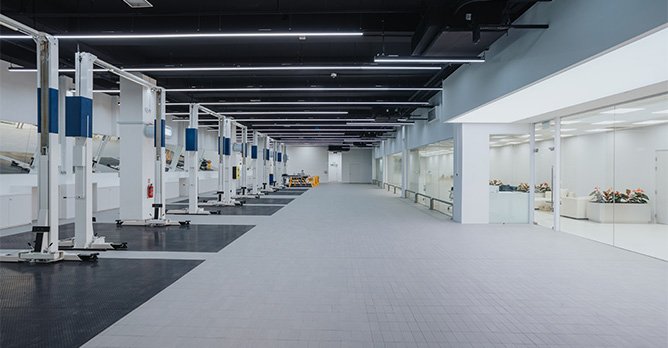
 The jointly-operated EV Servicing Centre serves as a key pillar of Komoco and Hyundai's local EV ecosystem The first in line, as some may already know, is a dedicated EV Servicing Centre - the first Hyundai-branded facility of its kind globally - located above Komoco Motors' Alexandra showroom. It will serve as a main pillar of an "EV ecosystem" that Hyundai is calling "an industry first".
The jointly-operated EV Servicing Centre serves as a key pillar of Komoco and Hyundai's local EV ecosystem The first in line, as some may already know, is a dedicated EV Servicing Centre - the first Hyundai-branded facility of its kind globally - located above Komoco Motors' Alexandra showroom. It will serve as a main pillar of an "EV ecosystem" that Hyundai is calling "an industry first".
Referring to the ecosystem, Kim promises, "Hyundai and Komoco will work together to improve and to introduce [this] to the customers in Singapore." Further plans are definitely in the pipeline, but for now, we are asked to keep our eyes patiently peeled.
A new way of doing things
One gets the sense that this tireless energy of embracing that there is no perfect end-state - just a constant 'work-in-progress' - is exactly what defines Hyundai's approach to its string of developments over the past half year. From day one, the venture has never been purely about carmaking, and it will continue to go beyond that moving forward.
"We want to innovate a mobility value chain: From the point of manufacturing to the customer experience," is how Kim defines it. "As Andy mentioned, this is a very new - brand new, in fact - kind of concept."
It's also this very quality of experimentation that makes the space so - pardon the pun - electrifying, and difficult to pull one's eyes away from. To return to the question of 'Why Singapore?', Kang also proffers, "Singapore has a very influential halo effect to not only Asia, but globally. So whenever we do something here, we believe this impact will spread to other regions."
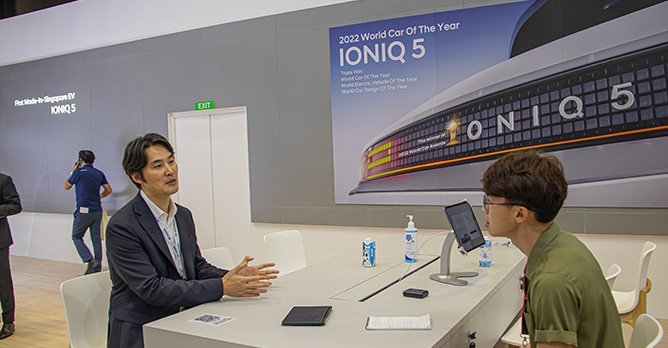
 Mr. Kang believes that Singapore possesses global influence, and that the innovations birthed at the HMGICS will soon spread to other regions too He knows starting at ground zero in a country long distanced from its car-building past will not be easy. "Of course, without any strong foundation here, we cannot do anything. So first, we have to build a very solid foundation here with the people of Singapore that will take us beyond."
Mr. Kang believes that Singapore possesses global influence, and that the innovations birthed at the HMGICS will soon spread to other regions too He knows starting at ground zero in a country long distanced from its car-building past will not be easy. "Of course, without any strong foundation here, we cannot do anything. So first, we have to build a very solid foundation here with the people of Singapore that will take us beyond."
He also knows that all eyes are on the company - but welcomes the building interest with arms open wide. "Everybody's very curious about why Hyundai has come to Singapore to invest this huge amount," he acknowledges with a smile, before following up with an invitation. "So as I mentioned (earlier) - please observe us, and what we're going to build."
Here are a few other stories that may interest you:
Our top 10 picks of the 2023 Singapore Motor Show
Singapore's forgotten EVs, Part 2: The Vanda Dendrobium, our first hypercar
Singapore's forgotten EVs, Part 3: The EVA taxi
About the E-GMP: Kia EV6 aside, these are the other cars riding on HMG's bespoke EV platform
Is the Hyundai brand officially cool now?
At this point, your mind is likely to float instantly to the Ioniq 5 'First 100's - the first 100 of said "Made in Singapore"-units, bearing special design accents, but more fascinatingly, 'EVS' rather than 'S'-prefixed number plates (such plates have not been allowed by the LTA on privately-owned cars before).
Yet while all that is undeniably impressive, perhaps more intriguing is how the Korean carmaker has made actual beyond-surface tweaks to the Ioniq 5 to suit the Singapore market.
To a large crowd encircling its booth at the 2023 Motor Show, it pulled the surprising move of announcing an 'Exclusive' trim of the Ioniq 5 thus far not seen in any other territory. Powered by a 143bhp (or 107kW) motor, this rear-wheel driven variant ducks under the 110kW power ceiling for mass market EVs, thus qualifying for a Cat A COE.
Still, even the Ioniq 5 Exclusive isn't the true star of the conversation. Literally towering further over it all is something that goes beyond just a single car (or a hundred).
Estimated at a cost of $400 million, a seven-storey, hyper-modern facility is set to open in the first half of 2023 in the Jurong Innovation District. It is out of this very site that the cars will roll out.
Why Singapore?
The news of the facility likewise raised many eyebrows when it broke in 2020. Singapore had long relinquished its car-assembling past in a bid to scale the manufacturing value-ladder, while close neighbours like Thailand have only grown more and more in favour with carmakers over the years. Would they not have been the default options to set up a base?
To demystify why Hyundai chose our tiny island over those long-standing heavy weights, you'll first have to dig into how it's named the new project. Note that it's not 'Hyundai Motor Group Factory Singapore'; it's 'Hyundai Motor Group Innovation Centre Singapore' (HMGICS).
"An innovation centre needs the most talented people to study and develop R&D together", Mr. Andy Kang, VP and Head of Sales and Innovation at HMGICS, tells us. "Singapore, I believe, is the highest standard in terms of very talented people and employees."
Slated to open in the first half of this year, the Centre will be powered by renewable energy, and introduce levels of technology Hyundai says have never been seen on a production site.
More concrete details are set to emerge closer to its grand unveiling, but Kang outlines a farm-to-table experience in the centre's restaurant as one of the most exciting things visitors can look forward to (fresh vegetables will be sourced on-site from what has been described for now as a "smart farm"). Go further up to the seventh floor of the "Innovation Lab", and a 620m-long Sky Track awaits customers for test drives.
Then, there's also the unprecedented level of automation that Hyundai is aiming to achieve. While not set in stone yet, Kang says a total workforce of just 30 people on the assembly line is being targeted, with the rest of the labour dedicated to "robotic arms".
"This is a centre that we really would like to be very advanced; which nobody from the automotive sector has tried (to achieve). This is what we are trying to do," he explains.
One key aspect of the Innovation Centre many may overlook at first is the significance of it coming directly under the Hyundai Motor Group. That means it bears weight not just for the Hyundai, but Kia and Genesis brands too.
"[The centre] is the global Group's first-opened innovation hub and testbed for our future-mobility innovation", Mr. Peter Kim, Business Planning at HMGICS, tells us. "So Group-wise and global-wise, HMGICS is very important for the Group."

As an example, Hyundai recently showcased its robotaxi test drives in Las Vegas through a video starring one anthropomorphic Ioniq 5. Its autonomous driving venture behind the scenes, Motional (co-led with tech firm Aptiv), also has a local presence in one-north. With the HMGICS now, it seems Singapore is being fortified as a shrine of continued learning and growth.
Establishing a direct presence while strengthening old ties
Another question many may have is how things for the Hyundai brand may change now that its mothership has a direct presence in Jurong. Thus far, the carmaker has been represented solely by its dealer, Komoco Motors (Kia comes under the wing of Cycle & Carriage instead), with whom it celebrates 37 years of partnership in 2023.
The duo are unfazed when we prod them about whether Hyundai is looking to fly solo, repeating unequivocally that the Group's medium to long term plan is to continue strengthening the relationship.
Although a direct sales channel has been established at HMGICS, it seems the Ioniq 5 will be found in Komoco showrooms at some point.
Kang assures us that both parties "will communicate the same message, same way of reaching customers and [provide] the same price, of course", although "in terms of the Ioniq 5 marketing or servicing policy… the brand strategy will be done by [HMGICS]."
Simultaneously, the thriving fields today ploughed by Komoco - as well as the painstaking efforts it has invested - are not missed on Hyundai as well.
"Komoco, on behalf of Hyundai in Singapore, have built our brand among the Singaporean customers for over 30 years. So they do have insights into our customers," Kim notes. The plan is to "provide more products - the best products - with Komoco together" towards a win-win situation for its customers.

Referring to the ecosystem, Kim promises, "Hyundai and Komoco will work together to improve and to introduce [this] to the customers in Singapore." Further plans are definitely in the pipeline, but for now, we are asked to keep our eyes patiently peeled.
A new way of doing things
One gets the sense that this tireless energy of embracing that there is no perfect end-state - just a constant 'work-in-progress' - is exactly what defines Hyundai's approach to its string of developments over the past half year. From day one, the venture has never been purely about carmaking, and it will continue to go beyond that moving forward.
"We want to innovate a mobility value chain: From the point of manufacturing to the customer experience," is how Kim defines it. "As Andy mentioned, this is a very new - brand new, in fact - kind of concept."
It's also this very quality of experimentation that makes the space so - pardon the pun - electrifying, and difficult to pull one's eyes away from. To return to the question of 'Why Singapore?', Kang also proffers, "Singapore has a very influential halo effect to not only Asia, but globally. So whenever we do something here, we believe this impact will spread to other regions."

He also knows that all eyes are on the company - but welcomes the building interest with arms open wide. "Everybody's very curious about why Hyundai has come to Singapore to invest this huge amount," he acknowledges with a smile, before following up with an invitation. "So as I mentioned (earlier) - please observe us, and what we're going to build."
Here are a few other stories that may interest you:
Our top 10 picks of the 2023 Singapore Motor Show
Singapore's forgotten EVs, Part 2: The Vanda Dendrobium, our first hypercar
Singapore's forgotten EVs, Part 3: The EVA taxi
About the E-GMP: Kia EV6 aside, these are the other cars riding on HMG's bespoke EV platform
Is the Hyundai brand officially cool now?
As it prepares to launch its first locally-assembled cars, Hyundai wants us to know that it values Singapore very much.
At this point, your mind is likely to float instantly to the Ioniq 5 'First 100's - the first 100 of said "Made in Singapore"-units, bearing special design accents, but more fascinatingly, 'EVS' rather than 'S'-prefixed number plates (such plates have not been allowed by the LTA on privately-owned cars before).
Yet while all that is undeniably impressive, perhaps more intriguing is how the Korean carmaker has made actual beyond-surface tweaks to the Ioniq 5 to suit the Singapore market.
To a large crowd encircling its booth at the 2023 Motor Show, it pulled the surprising move of announcing an 'Exclusive' trim of the Ioniq 5 thus far not seen in any other territory. Powered by a 143bhp (or 107kW) motor, this rear-wheel driven variant ducks under the 110kW power ceiling for mass market EVs, thus qualifying for a Cat A COE.
Still, even the Ioniq 5 Exclusive isn't the true star of the conversation. Literally towering further over it all is something that goes beyond just a single car (or a hundred).
Estimated at a cost of $400 million, a seven-storey, hyper-modern facility is set to open in the first half of 2023 in the Jurong Innovation District. It is out of this very site that the cars will roll out.
Why Singapore?
The news of the facility likewise raised many eyebrows when it broke in 2020. Singapore had long relinquished its car-assembling past in a bid to scale the manufacturing value-ladder, while close neighbours like Thailand have only grown more and more in favour with carmakers over the years. Would they not have been the default options to set up a base?
To demystify why Hyundai chose our tiny island over those long-standing heavy weights, you'll first have to dig into how it's named the new project. Note that it's not 'Hyundai Motor Group Factory Singapore'; it's 'Hyundai Motor Group Innovation Centre Singapore' (HMGICS).
"An innovation centre needs the most talented people to study and develop R&D together", Mr. Andy Kang, VP and Head of Sales and Innovation at HMGICS, tells us. "Singapore, I believe, is the highest standard in terms of very talented people and employees."
Slated to open in the first half of this year, the Centre will be powered by renewable energy, and introduce levels of technology Hyundai says have never been seen on a production site.
More concrete details are set to emerge closer to its grand unveiling, but Kang outlines a farm-to-table experience in the centre's restaurant as one of the most exciting things visitors can look forward to (fresh vegetables will be sourced on-site from what has been described for now as a "smart farm"). Go further up to the seventh floor of the "Innovation Lab", and a 620m-long Sky Track awaits customers for test drives.
Then, there's also the unprecedented level of automation that Hyundai is aiming to achieve. While not set in stone yet, Kang says a total workforce of just 30 people on the assembly line is being targeted, with the rest of the labour dedicated to "robotic arms".
"This is a centre that we really would like to be very advanced; which nobody from the automotive sector has tried (to achieve). This is what we are trying to do," he explains.
One key aspect of the Innovation Centre many may overlook at first is the significance of it coming directly under the Hyundai Motor Group. That means it bears weight not just for the Hyundai, but Kia and Genesis brands too.
"[The centre] is the global Group's first-opened innovation hub and testbed for our future-mobility innovation", Mr. Peter Kim, Business Planning at HMGICS, tells us. "So Group-wise and global-wise, HMGICS is very important for the Group."

 Motional, a co-venture of Hyundai and Aptiv, has also been running self-driving test runs in one-north While its roots are firmly planted in Seoul, the South Korean conglomerate has long stretched its branches far and wide into the world via a multitude of international living labs. The resulting wealth of knowledge, amassed from this decentralised experience-building, is then intended to trickle down to its vehicles across the entire Group.
Motional, a co-venture of Hyundai and Aptiv, has also been running self-driving test runs in one-north While its roots are firmly planted in Seoul, the South Korean conglomerate has long stretched its branches far and wide into the world via a multitude of international living labs. The resulting wealth of knowledge, amassed from this decentralised experience-building, is then intended to trickle down to its vehicles across the entire Group.
As an example, Hyundai recently showcased its robotaxi test drives in Las Vegas through a video starring one anthropomorphic Ioniq 5. Its autonomous driving venture behind the scenes, Motional (co-led with tech firm Aptiv), also has a local presence in one-north. With the HMGICS now, it seems Singapore is being fortified as a shrine of continued learning and growth.
Establishing a direct presence while strengthening old ties
Another question many may have is how things for the Hyundai brand may change now that its mothership has a direct presence in Jurong. Thus far, the carmaker has been represented solely by its dealer, Komoco Motors (Kia comes under the wing of Cycle & Carriage instead), with whom it celebrates 37 years of partnership in 2023.
The duo are unfazed when we prod them about whether Hyundai is looking to fly solo, repeating unequivocally that the Group's medium to long term plan is to continue strengthening the relationship.
Although a direct sales channel has been established at HMGICS, it seems the Ioniq 5 will be found in Komoco showrooms at some point.
Kang assures us that both parties "will communicate the same message, same way of reaching customers and [provide] the same price, of course", although "in terms of the Ioniq 5 marketing or servicing policy… the brand strategy will be done by [HMGICS]."
Simultaneously, the thriving fields today ploughed by Komoco - as well as the painstaking efforts it has invested - are not missed on Hyundai as well.
"Komoco, on behalf of Hyundai in Singapore, have built our brand among the Singaporean customers for over 30 years. So they do have insights into our customers," Kim notes. The plan is to "provide more products - the best products - with Komoco together" towards a win-win situation for its customers.

 The jointly-operated EV Servicing Centre serves as a key pillar of Komoco and Hyundai's local EV ecosystem The first in line, as some may already know, is a dedicated EV Servicing Centre - the first Hyundai-branded facility of its kind globally - located above Komoco Motors' Alexandra showroom. It will serve as a main pillar of an "EV ecosystem" that Hyundai is calling "an industry first".
The jointly-operated EV Servicing Centre serves as a key pillar of Komoco and Hyundai's local EV ecosystem The first in line, as some may already know, is a dedicated EV Servicing Centre - the first Hyundai-branded facility of its kind globally - located above Komoco Motors' Alexandra showroom. It will serve as a main pillar of an "EV ecosystem" that Hyundai is calling "an industry first".
Referring to the ecosystem, Kim promises, "Hyundai and Komoco will work together to improve and to introduce [this] to the customers in Singapore." Further plans are definitely in the pipeline, but for now, we are asked to keep our eyes patiently peeled.
A new way of doing things
One gets the sense that this tireless energy of embracing that there is no perfect end-state - just a constant 'work-in-progress' - is exactly what defines Hyundai's approach to its string of developments over the past half year. From day one, the venture has never been purely about carmaking, and it will continue to go beyond that moving forward.
"We want to innovate a mobility value chain: From the point of manufacturing to the customer experience," is how Kim defines it. "As Andy mentioned, this is a very new - brand new, in fact - kind of concept."
It's also this very quality of experimentation that makes the space so - pardon the pun - electrifying, and difficult to pull one's eyes away from. To return to the question of 'Why Singapore?', Kang also proffers, "Singapore has a very influential halo effect to not only Asia, but globally. So whenever we do something here, we believe this impact will spread to other regions."

 Mr. Kang believes that Singapore possesses global influence, and that the innovations birthed at the HMGICS will soon spread to other regions too He knows starting at ground zero in a country long distanced from its car-building past will not be easy. "Of course, without any strong foundation here, we cannot do anything. So first, we have to build a very solid foundation here with the people of Singapore that will take us beyond."
Mr. Kang believes that Singapore possesses global influence, and that the innovations birthed at the HMGICS will soon spread to other regions too He knows starting at ground zero in a country long distanced from its car-building past will not be easy. "Of course, without any strong foundation here, we cannot do anything. So first, we have to build a very solid foundation here with the people of Singapore that will take us beyond."
He also knows that all eyes are on the company - but welcomes the building interest with arms open wide. "Everybody's very curious about why Hyundai has come to Singapore to invest this huge amount," he acknowledges with a smile, before following up with an invitation. "So as I mentioned (earlier) - please observe us, and what we're going to build."
Here are a few other stories that may interest you:
Our top 10 picks of the 2023 Singapore Motor Show
Singapore's forgotten EVs, Part 2: The Vanda Dendrobium, our first hypercar
Singapore's forgotten EVs, Part 3: The EVA taxi
About the E-GMP: Kia EV6 aside, these are the other cars riding on HMG's bespoke EV platform
Is the Hyundai brand officially cool now?
At this point, your mind is likely to float instantly to the Ioniq 5 'First 100's - the first 100 of said "Made in Singapore"-units, bearing special design accents, but more fascinatingly, 'EVS' rather than 'S'-prefixed number plates (such plates have not been allowed by the LTA on privately-owned cars before).
Yet while all that is undeniably impressive, perhaps more intriguing is how the Korean carmaker has made actual beyond-surface tweaks to the Ioniq 5 to suit the Singapore market.
To a large crowd encircling its booth at the 2023 Motor Show, it pulled the surprising move of announcing an 'Exclusive' trim of the Ioniq 5 thus far not seen in any other territory. Powered by a 143bhp (or 107kW) motor, this rear-wheel driven variant ducks under the 110kW power ceiling for mass market EVs, thus qualifying for a Cat A COE.
Still, even the Ioniq 5 Exclusive isn't the true star of the conversation. Literally towering further over it all is something that goes beyond just a single car (or a hundred).
Estimated at a cost of $400 million, a seven-storey, hyper-modern facility is set to open in the first half of 2023 in the Jurong Innovation District. It is out of this very site that the cars will roll out.
Why Singapore?
The news of the facility likewise raised many eyebrows when it broke in 2020. Singapore had long relinquished its car-assembling past in a bid to scale the manufacturing value-ladder, while close neighbours like Thailand have only grown more and more in favour with carmakers over the years. Would they not have been the default options to set up a base?
To demystify why Hyundai chose our tiny island over those long-standing heavy weights, you'll first have to dig into how it's named the new project. Note that it's not 'Hyundai Motor Group Factory Singapore'; it's 'Hyundai Motor Group Innovation Centre Singapore' (HMGICS).
"An innovation centre needs the most talented people to study and develop R&D together", Mr. Andy Kang, VP and Head of Sales and Innovation at HMGICS, tells us. "Singapore, I believe, is the highest standard in terms of very talented people and employees."
Slated to open in the first half of this year, the Centre will be powered by renewable energy, and introduce levels of technology Hyundai says have never been seen on a production site.
More concrete details are set to emerge closer to its grand unveiling, but Kang outlines a farm-to-table experience in the centre's restaurant as one of the most exciting things visitors can look forward to (fresh vegetables will be sourced on-site from what has been described for now as a "smart farm"). Go further up to the seventh floor of the "Innovation Lab", and a 620m-long Sky Track awaits customers for test drives.
Then, there's also the unprecedented level of automation that Hyundai is aiming to achieve. While not set in stone yet, Kang says a total workforce of just 30 people on the assembly line is being targeted, with the rest of the labour dedicated to "robotic arms".
"This is a centre that we really would like to be very advanced; which nobody from the automotive sector has tried (to achieve). This is what we are trying to do," he explains.
One key aspect of the Innovation Centre many may overlook at first is the significance of it coming directly under the Hyundai Motor Group. That means it bears weight not just for the Hyundai, but Kia and Genesis brands too.
"[The centre] is the global Group's first-opened innovation hub and testbed for our future-mobility innovation", Mr. Peter Kim, Business Planning at HMGICS, tells us. "So Group-wise and global-wise, HMGICS is very important for the Group."

As an example, Hyundai recently showcased its robotaxi test drives in Las Vegas through a video starring one anthropomorphic Ioniq 5. Its autonomous driving venture behind the scenes, Motional (co-led with tech firm Aptiv), also has a local presence in one-north. With the HMGICS now, it seems Singapore is being fortified as a shrine of continued learning and growth.
Establishing a direct presence while strengthening old ties
Another question many may have is how things for the Hyundai brand may change now that its mothership has a direct presence in Jurong. Thus far, the carmaker has been represented solely by its dealer, Komoco Motors (Kia comes under the wing of Cycle & Carriage instead), with whom it celebrates 37 years of partnership in 2023.
The duo are unfazed when we prod them about whether Hyundai is looking to fly solo, repeating unequivocally that the Group's medium to long term plan is to continue strengthening the relationship.
Although a direct sales channel has been established at HMGICS, it seems the Ioniq 5 will be found in Komoco showrooms at some point.
Kang assures us that both parties "will communicate the same message, same way of reaching customers and [provide] the same price, of course", although "in terms of the Ioniq 5 marketing or servicing policy… the brand strategy will be done by [HMGICS]."
Simultaneously, the thriving fields today ploughed by Komoco - as well as the painstaking efforts it has invested - are not missed on Hyundai as well.
"Komoco, on behalf of Hyundai in Singapore, have built our brand among the Singaporean customers for over 30 years. So they do have insights into our customers," Kim notes. The plan is to "provide more products - the best products - with Komoco together" towards a win-win situation for its customers.

Referring to the ecosystem, Kim promises, "Hyundai and Komoco will work together to improve and to introduce [this] to the customers in Singapore." Further plans are definitely in the pipeline, but for now, we are asked to keep our eyes patiently peeled.
A new way of doing things
One gets the sense that this tireless energy of embracing that there is no perfect end-state - just a constant 'work-in-progress' - is exactly what defines Hyundai's approach to its string of developments over the past half year. From day one, the venture has never been purely about carmaking, and it will continue to go beyond that moving forward.
"We want to innovate a mobility value chain: From the point of manufacturing to the customer experience," is how Kim defines it. "As Andy mentioned, this is a very new - brand new, in fact - kind of concept."
It's also this very quality of experimentation that makes the space so - pardon the pun - electrifying, and difficult to pull one's eyes away from. To return to the question of 'Why Singapore?', Kang also proffers, "Singapore has a very influential halo effect to not only Asia, but globally. So whenever we do something here, we believe this impact will spread to other regions."

He also knows that all eyes are on the company - but welcomes the building interest with arms open wide. "Everybody's very curious about why Hyundai has come to Singapore to invest this huge amount," he acknowledges with a smile, before following up with an invitation. "So as I mentioned (earlier) - please observe us, and what we're going to build."
Here are a few other stories that may interest you:
Our top 10 picks of the 2023 Singapore Motor Show
Singapore's forgotten EVs, Part 2: The Vanda Dendrobium, our first hypercar
Singapore's forgotten EVs, Part 3: The EVA taxi
About the E-GMP: Kia EV6 aside, these are the other cars riding on HMG's bespoke EV platform
Is the Hyundai brand officially cool now?
Thank You For Your Subscription.





















